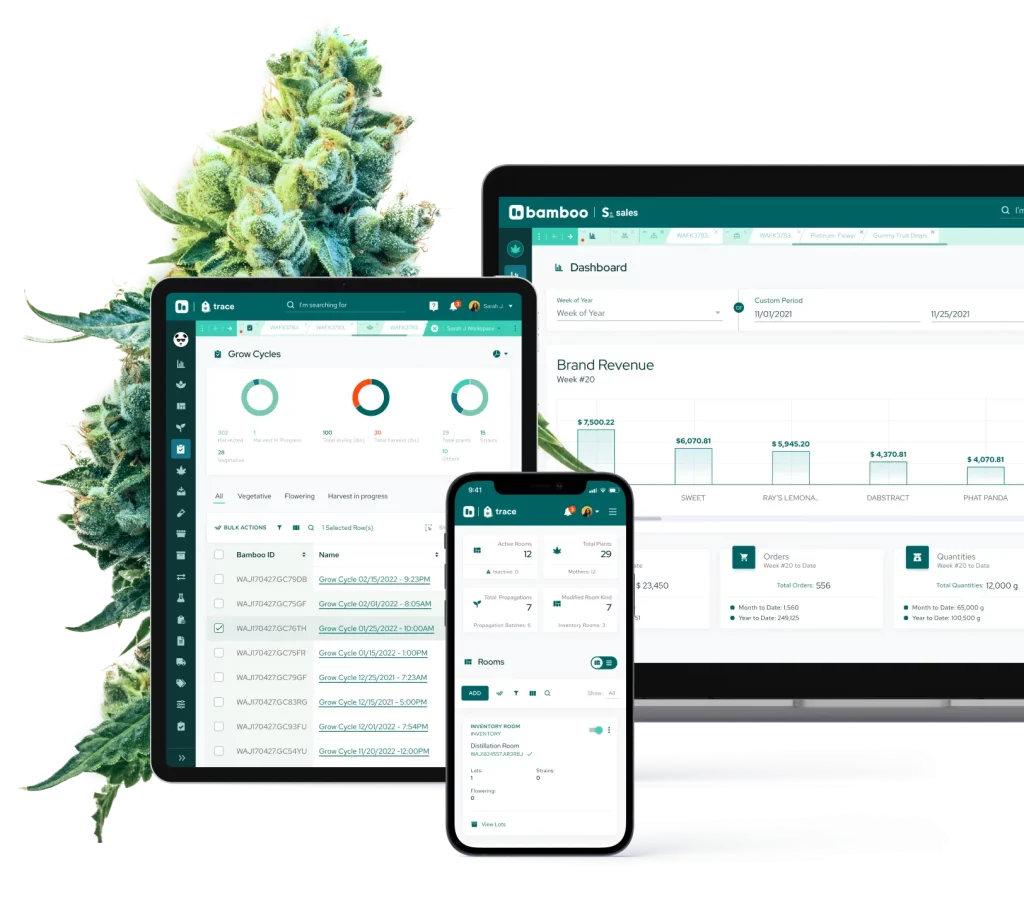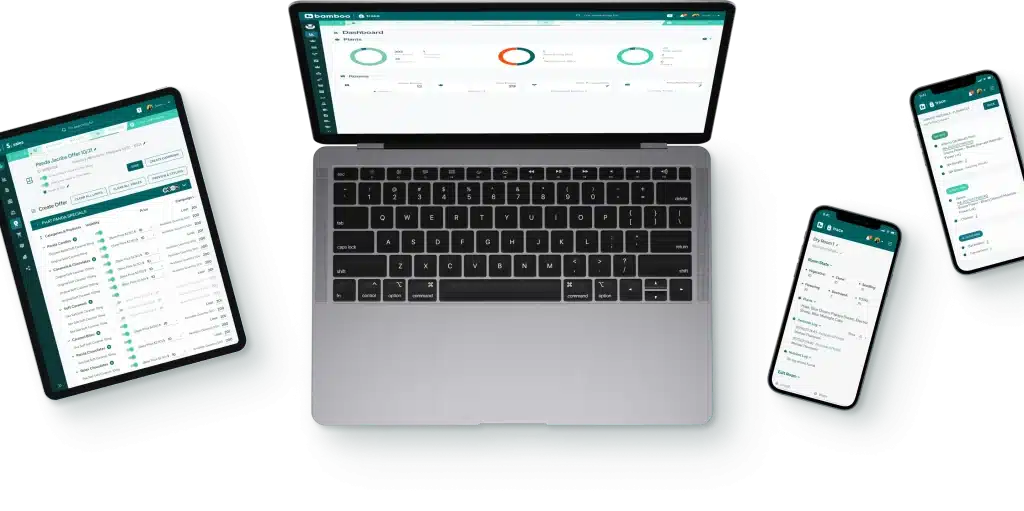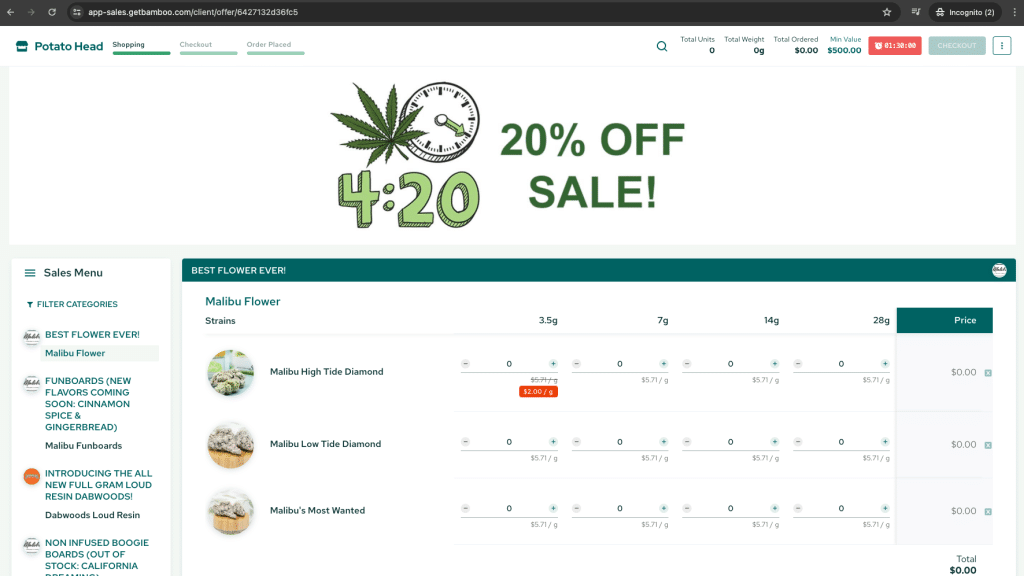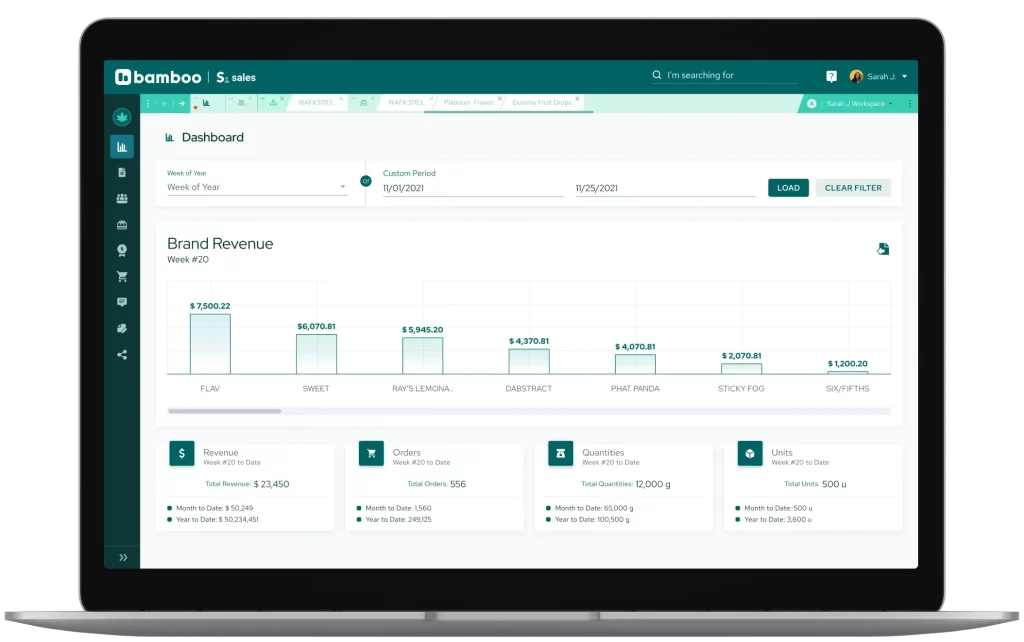Massachusetts Seed to Sale Cannabis Software
Bamboo ensures complete compliance with Massachusetts state regulations and the Cannabis Control Commission. Through seamless integration with Metrc, Bamboo Trace simplifies the entire seed-to-sale process in Massachusetts, eliminating tedious tasks and saving operators valuable time.
When combined with Bamboo Sales and Bamboo Cashier, the Bamboo platform addresses the needs of businesses of all sizes within Massachusetts. Leveraging state-of-the-art technology, Bamboo provides a seamless experience tailored for both small-scale enterprises and multi-state operators.

Massachusetts' Recreational Market
Massachusetts’ recreational cannabis market has continued to expand and mature, building on its strong foundation since the first adult-use sales began in November 2018. Here’s an overview of some key developments:
- Sales and revenue:
- According to the Massachusetts Cannabis Control Commission, total adult-use cannabis sales for the 2023 calendar year reached approximately $1.8 billion, a 20% increase from the previous year.
- The state collected around $360 million in cannabis tax revenue, which is allocated to various programs, including public health, education, and community reinvestment.
- Market trends:
- Massachusetts saw a continued increase in the popularity of cannabis-infused beverages and edibles, with new product launches and partnerships driving innovation and consumer interest.
- The market also experienced a growing demand for organic and sustainably grown cannabis products, with many consumers seeking out environmentally friendly options.
- Delivery services and curbside pickup gained traction, particularly in the wake of the COVID-19 pandemic, providing consumers with convenient access to legal cannabis.
- Regulatory updates:
- In mid-2023, the Massachusetts Cannabis Control Commission implemented new regulations aimed at enhancing product safety and transparency, including more stringent testing requirements and clearer labeling standards.
- The state also expanded its social equity program, providing additional resources and support for individuals and communities disproportionately impacted by cannabis prohibition.
- Industry developments:
- Several new retail locations and cultivation facilities opened across Massachusetts, particularly in underserved areas and communities that had previously opted out of hosting cannabis businesses.
- The market saw increased consolidation, with larger multi-state operators acquiring smaller local businesses to expand their footprint and market share.
- Massachusetts-based cannabis companies also began exploring expansion opportunities in other states, leveraging their experience and brand recognition.
- Social equity:
- Massachusetts’ cannabis regulations continued to prioritize social equity, with a robust program that provides licensing assistance, training, and mentorship for individuals from disproportionately impacted communities.
- The state also expanded its expungement efforts, working to clear the records of individuals with past cannabis convictions.
- Challenges:
- Despite the growth of the legal market, Massachusetts still faced challenges related to the illicit market, with unlicensed operators undercutting prices and evading regulations.
- The state also grappled with issues of local control, with some municipalities imposing strict zoning requirements or limiting the number of cannabis businesses allowed to operate.
Overall, Massachusetts’ recreational cannabis market has demonstrated sustained growth and maturation, with increasing sales, product innovation, and a strong commitment to social equity. As one of the first states on the East Coast to legalize adult-use cannabis, Massachusetts has established itself as a leader in the industry, setting an example for responsible regulation, community reinvestment, and consumer protection. However, ongoing challenges related to the illicit market and local control will require continued collaboration and adaptation from regulators, operators, and community stakeholders.
Why Do Massachusetts Cannabis Businesses Love Bamboo?
Bamboo enhances the efficiency of purchasing and selling cannabis products through modernized Sales Menus, robust performance tracking, and in-depth consumer analytics. By integrating innovative solutions, Bamboo empowers businesses to optimize their operations, make data-driven decisions, and elevate the overall customer experience in the cannabis industry.
Massachusetts' Road to Recreational Cannabis
Massachusetts has had a progressive approach to cannabis, with a history of supporting medical use and eventually legalizing recreational cannabis. Here’s a brief overview of Massachusetts’ road to recreational cannabis:
- 2008 – Massachusetts voters decriminalized possession of small amounts of cannabis through a ballot initiative.
- 2012 – The state legalized medical cannabis through another ballot initiative, allowing patients with qualifying conditions to access cannabis with a doctor’s recommendation.
- 2016 – Massachusetts voters approved Question 4, a ballot measure to legalize recreational cannabis for adults 21 and older. The measure passed with 53.7% of the vote.
- December 2016 – Following the passage of Question 4, the state legislature delayed the opening of recreational dispensaries by six months to allow more time for crafting regulations.
- July 2017 – Governor Charlie Baker signed the revised cannabis legalization bill into law, establishing the Cannabis Control Commission (CCC) to oversee the new industry.
- March 2018 – The CCC began accepting applications for cannabis business licenses, including cultivators, manufacturers, and retailers.
- November 2018 – The first recreational cannabis dispensaries opened in Massachusetts, two years after the legalization vote.
- 2019-2020 – The state’s recreational cannabis market continued to expand, with more dispensaries opening and sales increasing.
- 2021 – Massachusetts reached a milestone of over $1 billion in gross sales since the start of recreational cannabis sales in November 2018.
Throughout the process, Massachusetts has focused on creating a well-regulated, diverse, and socially equitable cannabis industry. The state has implemented programs to support social equity applicants and communities disproportionately impacted by previous cannabis prohibition.
As the market matures, Massachusetts continues to refine its regulations and policies to ensure a safe, accessible, and sustainable recreational cannabis industry.
Traceability, Compliance & Regulation in Massachusetts
All cannabis operators in Massachusetts are to stay in compliance with the regulatory guidelines set forth by the Cannabis Control Commission. Metrc is a company contracted by the CCC to help track the cultivation, processing, and sales of cannabis products. By integrating directly with Metrc Connect, Metrc’s new and improved API system, Bamboo Trace provides users a sleek interface to manage all seed-to-sale operations while fulfulling the reporting requirements of the state.
Recreational cannabis became legalized in Massachusetts in November 2016. The first sales happened 2 years later.
- Traceability:
- Massachusetts uses the Metrc (Marijuana Enforcement Tracking Reporting Compliance) system for seed-to-sale tracking of cannabis products.
- All licensed cannabis businesses are required to use Metrc to track inventory, transfers, and sales.
- Unique identifier tags are assigned to each plant and product package, allowing for detailed tracking throughout the supply chain.
- Compliance:
- Cannabis businesses must adhere to strict regulations set by the CCC, including security requirements, inventory tracking, and product testing.
- Dispensaries must verify customers’ ages and purchase limits to ensure compliance with state laws.
- Licensees are required to maintain detailed records and report regularly to the CCC through the Metrc system.
- Regulation:
- The CCC is responsible for licensing and regulating cannabis businesses, including cultivators, manufacturers, retailers, and testing laboratories.
- The commission sets rules for packaging, labeling, marketing, and advertising of cannabis products to protect public health and safety.
- The CCC conducts regular inspections and audits to ensure licensees comply with state regulations.
- Testing:
- All cannabis products must be tested by independent, CCC-licensed laboratories before being sold to consumers.
- Testing includes analyzing potency, contaminants, and other quality control measures.
- Test results are recorded in the Metrc system to ensure only compliant products reach the market.
- Social Equity:
- Massachusetts has implemented a Social Equity Program to promote diversity and inclusion in the cannabis industry.
- The program provides training, technical assistance, and priority licensing for applicants from communities disproportionately impacted by previous cannabis prohibition.
- Enforcement:
- The CCC has the authority to investigate violations, issue fines, and suspend or revoke licenses for non-compliance.
- The commission works with law enforcement agencies to prevent diversion of cannabis products to the illicit market.
The Cannabis Control Commission (CCC) is the state agency responsible for overseeing the industry. Here are some key aspects of the state’s approach:
- Licensing:
- The CCC issues licenses for cannabis cultivators, product manufacturers, testing laboratories, retailers, and transporters.
- Applicants must meet strict requirements related to security, operations, and financial stability.
- Priority is given to social equity applicants and communities disproportionately impacted by previous cannabis prohibition.
- Seed-to-sale tracking:
- All licensed cannabis businesses must use the state’s seed-to-sale tracking system, Metrc, to monitor the movement of cannabis products from cultivation to sale.
- This system helps prevent diversion to the illicit market and ensures products are coming from licensed sources.
- It also enables product recalls if any safety issues are identified.
- Testing and safety:
- All cannabis products must be tested by licensed independent laboratories for potency, purity, and contaminants before being sold to consumers.
- Products must be properly packaged in child-resistant, tamper-evident containers and labeled with warnings and information about content and potency.
- Strict manufacturing standards are in place to ensure product safety and consistency.
- Advertising and marketing:
- There are significant restrictions on cannabis advertising to prevent appeal to minors and promote responsible consumption.
- Advertising cannot depict actual consumption or make unproven health claims.
- Marketing must include necessary warning statements.
- Local control:
- Cities and towns have the authority to ban or limit the number of cannabis establishments within their borders.
- They can also establish additional local regulations and zoning restrictions.
- Taxes and revenue:
- Adult-use cannabis sales are subject to state excise taxes (10.75%) and the regular sales tax (6.25%).
- A portion of the tax revenue is allocated to public health and safety initiatives, as well as social equity programs.
The CCC conducts regular inspections and audits to ensure licensed businesses are complying with all regulations. Penalties for non-compliance can include fines, license suspensions, or even revocation. The goal is to maintain a safe, transparent, and well-regulated cannabis industry that keeps products out of the hands of minors and protects public health.
Tired of cannabis marketplaces like Leaflink and LeafTrade?
Cannabis marketplaces function as convenient hubs where buyers can peruse a diverse assortment of brands and products, akin to flipping through a magazine or catalog. However, this convenience often fosters a race-to-the-bottom dynamic among sellers (cannabis brands).
Platforms like Leaflink, LeafTrade, Apex Trading, etc, while theoretically beneficial, primarily serve as showcases for brands with limited added value. Consequently, sellers find themselves grappling with constrained control over product presentation and struggle to set themselves apart.
Enter Bamboo: a solution crafted to empower cannabis brands by granting them control over their sales strategies. Through customizable sales menus and recommended order tools, Bamboo equips brands with the means to captivate buyers’ attention and drive increased sales. When buyers focus on a specific brand’s products, they tend to engage more deeply and make larger purchases.
Ultimately, the success of a cannabis brand hinges on the effort invested in optimizing its own sales menus and customizable strategies. While relying on marketplaces for exposure may seem appealing, brands that take charge of their sales menus typically achieve greater long-term success.
What is Bamboo?
Why Bamboo?
At Bamboo, we’ve noticed that the most successful cannabis brands go beyond relying solely on marketplaces. Instead, they empower their sales representatives to secure orders directly in stores using Bamboo Sales Menus. On average, our data shows that sales reps account for approximately 50% of orders for dispensaries’ clients, with the remaining 50% placed directly by purchasing managers.
(Keep in mind that Bamboo Sales Menus aren’t limited to products sold exclusively to dispensaries and stores. Cannabis brands can also utilize them to sell to other entities like cultivators, producers, processors, manufacturers, and more.
While marketplaces offer advantages, there’s potential for additional sales by leveraging Bamboo Sales’ internal email marketing platform. With Bamboo Sales, you can effortlessly send sales menus to your clients and sales reps using the built-in email feature.
Sales reps and buyers can access the menus with a single click from the email, eliminating the need for logging in. Furthermore, sales reps can conveniently retrieve the sales menu links within the platform to place orders on behalf of buyers and stores.
In need of creating recommended orders (proposals) for clients? Bamboo Sales has got you covered. And let’s not forget, you can embed these sales menus directly onto your website with Bamboo’s straightforward code implementation. It’s a seamless and effective way to expand your sales channels.
If you’re not seeing an uptick in sales through our email marketing, real-time sales menus, recommended orders, or website integration, then we haven’t met our goal as a leading cannatech company.
Bamboo Trace
✔ Quick-action buttons available in every module for swift navigation and action execution.
✔ Simplified traceability through real-time two-way synchronization with Massachusetts’ seed-to-sale system (Metrc).
✔ Receive instant notifications for important updates and events.
✔ Work in offline mode, accessible on both mobile and desktop devices, especially useful during periods of downtime in Metrc API systems.
✔ Ability to support multiple licenses for comprehensive management of operations.
✔ Customize label templates to meet Massachusetts’ Metrc regulations and efficiently generate multiple labels for various plant and product requirements.
✔ Comprehensive management of Strains, Rooms, Propagations, Grow Cycles, Plants, Harvests, Disposals, Inventories, Conversions, QA Samples, and more, all integrated within Bamboo Trace.
✔ Effortlessly process orders and generate manifests in just minutes for enhanced efficiency.

Bamboo Sales
✔ Utilize the finest Sales Menus available in Cannatech for enhanced sales strategies.
✔ Seamlessly integrate Sales Menus with your website for expanded reach and accessibility.
✔ Simplify email marketing efforts with the built-in feature tailored for sending sales menus effortlessly.
✔ Gain insights through comprehensive sales analytics and reporting on clients, sales reps, and customizable metrics.
✔ Generate numerous recommended orders (proposals) to cater to diverse client needs.
✔ Customize Real-time Sales Menus according to preferences and branding.
✔ Easily manage discounts, credits, pricing tiers, and distribution lists for streamlined operations.
✔ Efficiently handle all your sales enablement strategies within the Bamboo Sales platform.

